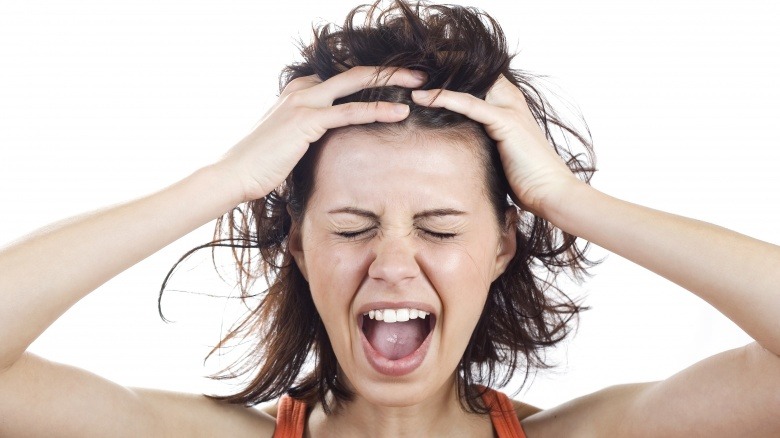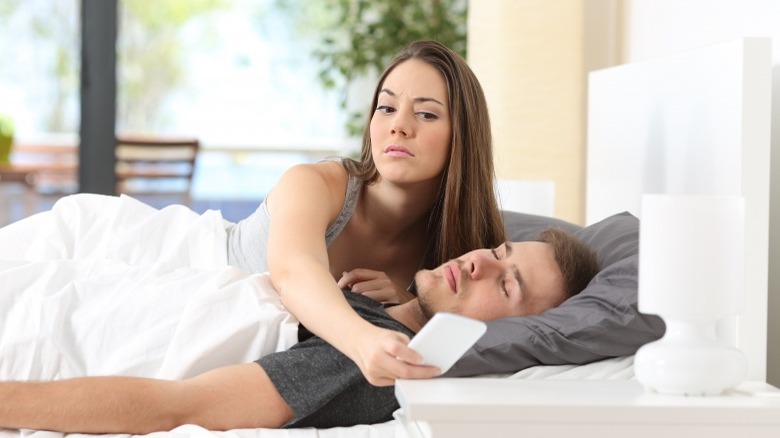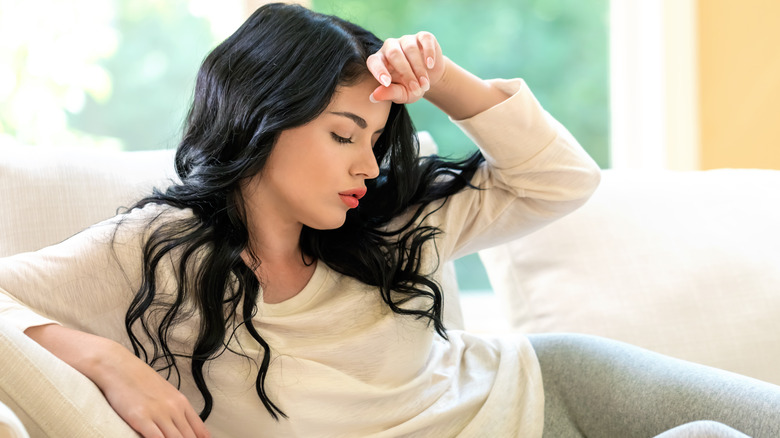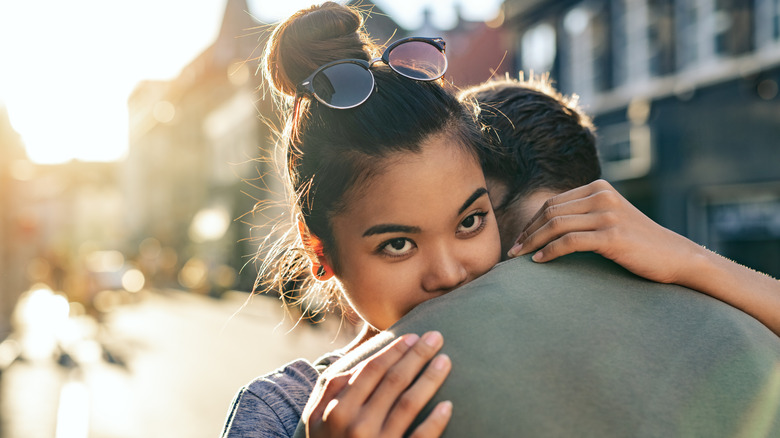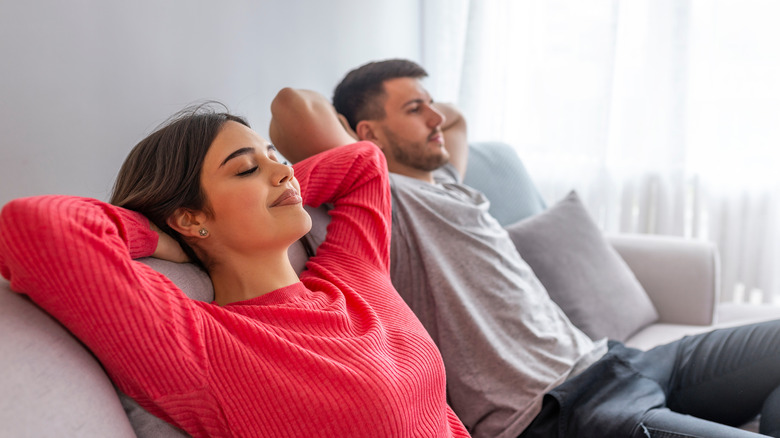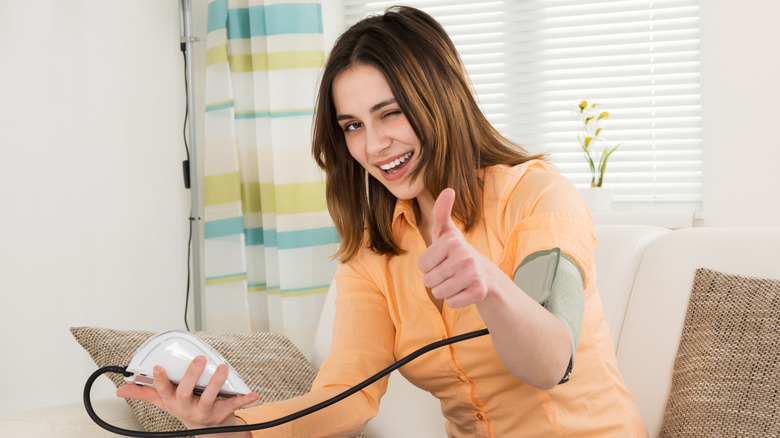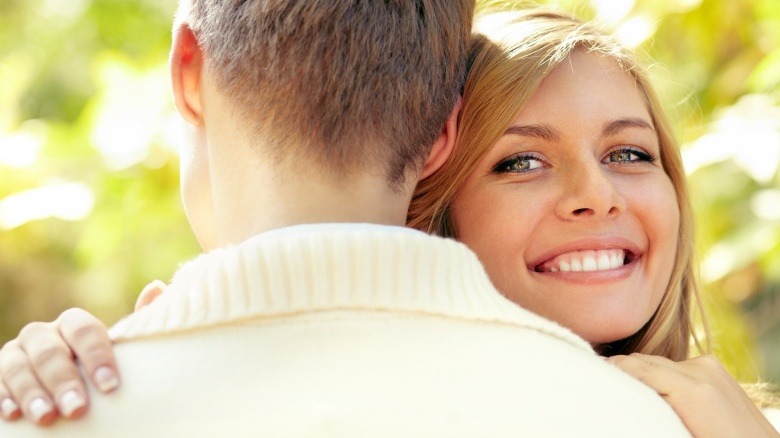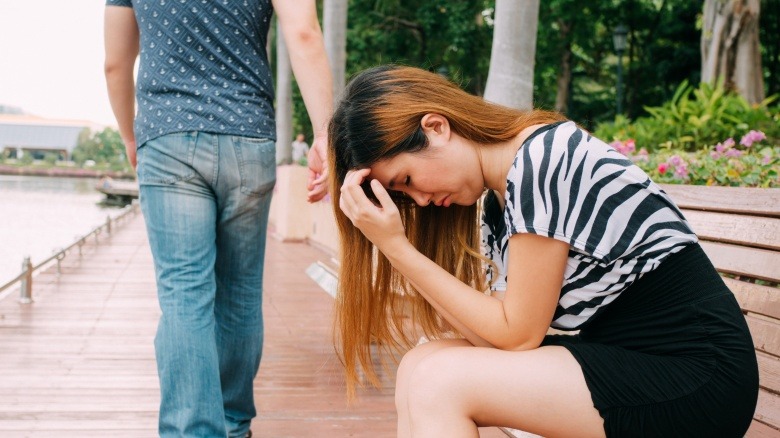What Really Happens To Your Body When You're In Love
What's better than falling in love? The sun is a little brighter, your coffee tastes a little better, and nothing can get you down. Oh, you hit my car when you were parallel parking? No worries. I've been meaning to take it in for an oil change anyways! When you're falling in love, nearly anything can be forgiven. Life just feels too good when you've got a special someone in your life!
But while that euphoric, loving feeling is amazing, it's also exhausting. Our brains are releasing a flood of new hormones making us feel happy, anxious, and sometimes just downright bonkers. Oftentimes our rational minds can hardly keep up with the racing thoughts and sweaty palms. It's important to remember that a lot of what we're feeling is just our biology. So don't worry — you're not nearly as needy as you're feeling right now. Here are just a few of the new feelings you're probably experiencing.
You'll feel crazy when you're falling in love
Queen Bey is not the only one who's felt crazy in love. The dizzying amount of hormones coursing through our bodies when we've met that right someone truly makes us a little nutty. Donatella Marazziti, professor of psychiatry and director of the laboratory of psychopharmacology at the University of Pisa, has found through her research that people falling in love have lower levels of serotonin in their brains. Want to know another group of people who have low serotonin? Individuals with obsessive-compulsive disorder. This helps explain why you can't help but overanalyze every text you get.
Don't worry, though. You won't be like this forever. As your relationship deepens, your brain returns to its normal levels. But before then, you could start feeling dizzy, too. "When we feel that initial attraction to someone, a cocktail of chemicals, phenethylamine, dopamine, and oxytocin are released," sex expert Simone Bienne told Cosmopolitan. "They keep your senses extra alert and give us the urge to bond and attach. As these secretions increase, our attraction to the object of our desire intensifies, and we get more and more of those dizzy feelings."
You'll want to be with your other half all the time when you're in love
In a new relationship, there's a magical time when you literally cannot see that special person enough. Your sole focus is on being together, and, when you're actually apart and hanging with your friends, you're looking for an excuse to bring up your new love in the conversation. This constant urge to be with your beau can leave you feeling a little needy, so it's helpful to know that it's just biology.
Psychologist Deborah Khoshaba, Psy.D. wrote in Psychology Today about why we can't stand to be apart from our significant others when we're in love. "Increased testosterone levels in women during the early stages of romantic love make them more sexual and aggressive," she explained. "While decreased testosterone levels in men make them more emotional and receptive at this time." These hormonal changes make women feel more sexual and men more empathetic. This is a recipe for both sides quickly becoming obsessed with each other.
You'll actually feel addicted to your beau when you're in love
Falling in love and feeling need to be with your beau 24/7 can put you at risk for making bad decisions.
A 2005 study looked at the brains of couples falling in love. When the study's participants were shown pictures of their new loves, their brains let out a flood of dopamine — the feel-good hormone that provides a reward response. "That someone takes on special meaning to you and you focus on this individual because the dopamine system has been activated," one of the study authors, biological anthropologist Helen Fisher, PhD, told Health about the study. "It is what triggers very goal oriented behavior, where no one else matters but your new partner." The study's authors provided an example to give us some perspective: When we see our beloved, our brains act the same way as if we had just tried cocaine!
The Little Book of Heartbreak: Love Gone Wrong Through the Ages authoer Meghan Laslocky told Greater Good Magazine, "Take this to its logical conclusion and, as far as brain wiring is concerned, when you're in love, it's not as if you're an addict. You are an addict."
When you're in love, you feel butterflies
We've all felt those butterflies before. Maybe you weren't expecting to see your new love interest as you're walking down the street, but then you look up and there he or she is! Immediately you feel ecstatic, nervous, and crazy. And you probably feel like your stomach does flips. Well, there is actually a physical reason for this feeling.
When we're falling in love, our brains release oxytocin and cortisol. Oxytocin is a loving, feel-good hormone, and cortisol is a stress hormone. So, this explains why we can feel so happy and nervous at once when we see someone we're falling in love with.When you look up on the street to see that special someone, your brain immediately starts pumping out those hormones. When the cortisol enters our bloodstream, it causes the blood vessels around our gut to constrict. This constricting sensation causes nausea or "butterflies."
When you're in love, your body treats it like an illness
"Falling in love is one of the most psychologically potent experiences in human life," scientists from the University of California in Los Angeles revealed in a report (via The Times). But there's more. "New romantic love is accompanied not only by psychological changes, but physiological changes as well," the researchers noted.
As part of their study, the scientists took blood samples from nearly 50 young women as they embarked on new relationships. They soon found that falling in love made the women's bodies produce more of the protein interferon. According to WebMD, these proteins are "part of your natural defenses" that usually "trigger killer immune cells to fight" germs as well as cancer cells. "Interferons got their name because they 'interfere' with viruses and keep them from multiplying," the site explained.
"Falling in love is linked with up-regulation of interferon," the researchers noted. "This is consistent with ... innate immune responses to viral infection." Hm, now that gives a whole new meaning to the term "lovesick," doesn't it?
You'll feel happy when you fall in love
Ever wonder why you're just so darn happy after you've started dating someone? "Falling in love causes our body to release a flood of feel-good chemicals that trigger specific physical reactions," Pat Mumby, professor and co-director of the Loyola Sexual Wellness Clinic, revealed to ScienceDaily. Oxytocin is not just responsible for butterflies in your stomach, but it's also one component behind that blissful feeling you experience when falling in love. Known as a "bonding" chemical, the body releases this hormone upon falling in love, after an orgasm, and while nursing a baby.
"Oxytocin, a bonding chemical that makes us enjoy sex, is designed to keep people together for as long as it takes to have loads of sex, a baby, and to raise it to safe levels," Dr. John Marsden, senior lecturer in addictive behavior at the National Addiction Centre, explained to Cosmopolitan. "Therefore, your body changes quickly with the emotion of love," Marsden went on.
You'll experience something similar to a runner's high when you're in love
In addition to releasing oxytocin and cortisol into the body, the brain responds to the feeling of being in love with an increased production of endorphins. A report published in the World Journal of Obstetrics and Gynecology explained that endorphins are "the body's natural opioids" and are "created and released by the central nervous system, hypothalamus and pituitary gland."
After experiencing the first two phases of love — lust and attraction — attachment sets in, according to sexual wellness experts at Loyola University Health System. During this third and final stage of love, endorphins work together with oxytocin and the hormone vasopressin to "flood the body" and create "an overall sense of well-being and security that is conducive to a lasting relationship."
However, you may feel more than just simply well or content. Endorphins are responsible for inducing what's known as a "runner's high" in athletes. Runner's World described these unique chemicals as "nature's home-brewed opiates," which "act a lot like their medically engineered counterpart, morphine." Yep, love might just make you feel high.
Your heart will beat faster when you're in love
When seeing your partner, you might notice your heart beating faster and faster. "Part of the whole attraction process is strongly linked to physiological arousal as a whole," Timothy Loving, assistant professor of human ecology at the University of Texas in Austin, explained to CNN Health. "Typically, that's going to start with things like increased heart rate, sweatiness and so on."
Reginald Ho, a cardiac electrophysiologist and associate professor of medicine at Thomas Jefferson University Hospital in Philadelphia, Penn., further added that adrenaline is the cause of this response — and it can really be quite strong. Ho revealed that your heartbeat may quicken in the same way it does when running on a treadmill. For the average, healthy individual, this is nothing to worry about. However, falling in love could actually be risky for someone with a serious heart condition, Ho told the publication.
When you're in love, you'll feel less stressed
Falling in love can make you quite literally feel weak in the knees, Helen Fisher, professor at Rutgers University and author of Why Him? Why Her? Finding Real Love by Understanding Your Personality Type, told CNN Health. The expert explained that the stress hormone norepinephrine is the likely cause. Nevertheless, stress hormones do more than just bring on physical responses. Cortisol — the other stress hormone released when falling in love — can also contribute to lowering your stress level.
In a study conducted by Timothy Loving, assistant professor of human ecology at the University of Texas in Austin, participants who'd recently fallen in love were instructed to look at a picture of their respective partners or friends. Loving and his team then asked the participants to reminisce about the moment they fell in love or desired a friendship, depending on the photo. The study volunteers who thought about falling in love experienced an increased production in stress hormones, including cortisol, which lasted as long as a half-hour after being asked to recall their experiences.
Your blood pressure may lower when you're in love
Could falling — and staying — in love be good for your heart health? According to a 2008 study conducted by researchers at Bringham Young University, signs point to yes. "There seem to be some unique health benefits from marriage," Professor Julianne Holt-Lunstad told ScienceDaily. "It's not just being married that benefits health — what's really the most protective of health is having a happy marriage."
According to the research, happily married adults were found to have lower blood pressure than single people, even those with "supportive social networks." Why? A study conducted by the University of North Carolina's Department of Psychiatry found that premenopausal women's blood pressure and heart rates were lower when they experienced higher oxytocin levels as well as frequent hugs from their partners. It seems the body's chemical and hormonal responses to falling in love may, in part, regulate blood pressure.
Your body will act as its own painkiller when you're in love
While being in love doesn't make you invincible, a study proved that it does improve your ability to handle pain. "When people are in this passionate, all-consuming phase of love, there are significant alterations in their mood that are impacting their experience of pain," Sean Mackey, physician-scientist, professor, and chief of the Division of Pain Management at Stanford, revealed.
As part of his study, Mackey, along with Arthur Aron, a professor of psychology at State University of New York at Stony Brook, asked 15 undergraduate students to bring in pictures of their partners as well as pictures of equally attractive acquaintances. While showing the participants the pictures, the researchers used a device that caused "mild pain." Meanwhile, the participants' brains were also scanned. The results were clear: Love was able to reduce participants' pain — "and at much higher levels than by concentrating on the photo of the attractive acquaintance."
"It turns out that the areas of the brain activated by intense love are the same areas that drugs use to reduce pain," Aron revealed. He noted, "This tells us that you don't have to just rely on drugs for pain relief."
How to stay yourself when you're in love
While falling in love is fun, it can really wreak havoc on your life. Psychologist Deborah Khoshaba, Psy.D. told Psychology Today that, during this time, we can easily start to lose ourselves. "You are adding a dating relationship to your normal, busy routine," she said. "Your normal responsibilities at work and home may fall to the wayside, as you put more energy into solidifying your love relationship."
Khoshaba explained that we feel a new sense of vulnerability at the beginning of a relationship. "Loving asks you to lower your defenses and loosen up your personal boundaries so that you can merge your needs and desires with those of your lover," she added. "This process can be threatening and make you feel unsafe."
She recommends following a few rules. First, keep your normal schedule, and make sure to take care of yourself. When anxious thoughts enter your mind, try to look at them objectively. Finally, she urged, "Don't lower your defenses, personal boundaries, and expectations to the extent that you are denying what you really desire and need. ... You want to build an authentic relationship attachment, rather than one based on fantasy alone."
What's going on when you fall out of love?
So if a rush of hormones causes us to feel crazy when we're falling in love and makes us happy, just imagine what happens to your body when you fall out of love. What's going on then?
Well, you will still experiencing physical changes, but, instead of being ecstatic about your exciting new love, you may instead feel alone and depressed. Meghan Laslocky, author of The Little Book of Heartbreak: Love Gone Wrong Through the Ages, wrote an article for Berkeley University's Greater Good Magazine about this very sensation. Laslocky shared, "You're still in love and want to reconcile, but you're also angry and confused." She added, "Simultaneously, you're jonesing for a 'fix' of the person who has abruptly left your life, and you might go to dramatic, even embarrassing, lengths to get it, even though part of you knows better."
